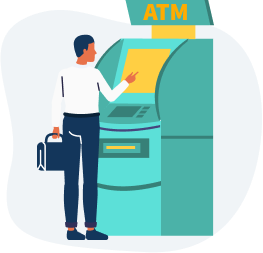Currency in Turkey
A Travel Money Guide to Turkey
The Republic of Türkiye (Turkey) has attracted tourists centuries and with its amazing historical sites like Aya Sofya, scrumptious food and coastal vistas. Even though it is a moderate costing destination, it’s a good idea to learn everything you can about the local currency and payment options before you go.
The currency that is used in Turkey / Republic of Türkiye
The currency they use in Turkey is the Turkish Lira. It is used by both locals and tourists. While most shop keepers in popular destinations like Istanbul will accept US dollars and Euros, the exchange rate they provide is unlikely to be competitive.
The official currency in the Republic of Türkiye, is the Turkish Lira, which has the international code TRY and the symbol ₺.
Money in Turkey
There are 6 different Turkish banknotes: 5₺ , 10₺, 20₺, 50₺, 100₺ and 200₺. The symbol appears after the number in shops and hotels, for example: 50₺.
The Turkish Lira is divided into 100 Kuruş (Kr). The Turkish Liras 6 coin denominations: 1Kr, 5Kr, 10Kr, 25Kr and 50Kr. Similar to the Australian dollar coin, in Turkey they also have a ₺1 coin.
Counterfeit notes are common in Turkey and can be distinguished by the banknotes paper, watermark, security fibers, security thread and holographic stripe foil and many other factors that can be found at the Turkiye Cumhurtiyet Murkez Bank.

Using Your Bank Card in Turkey
Most Turkish businesses are well set up to receive card payments. Some of the best travel money cards include debit, credit and prepaid cards. But before you use your bank card willy-nilly, it’s worth reading up on the fees and charges you might incur.
It’s important to know about dynamic currency conversion (DCC) when using a bank card abroad. DCC is where the credit card processor, such as a shop or hotel, converts the currency and charges you in your home currency rather than euros.
You’ll typically be asked how you’d like to be charged – in every case, choose the local currency. Otherwise, you may end up paying additional fees for the service, alongside the other bank fees.
Debit Cards
You’ll probably want a debit card if you plan to withdraw money from an ATM. While you may also be able to pay with a debit card in some businesses in the major destinations, you might discover some hefty fees on your account summary.
Depending on your bank, you could be hit with fees for foreign ATM withdrawals or currency conversions. But some banks are better than others; we recommend checking out Wise, ING and Revolut, all of which have travel-friendly debit cards that waive these charges.


Credit Cards
Credit cards can come with some enticing perks, including added security, loyalty programs, and even free travel insurance.
But are they worth it?
Major local businesses, including hotels, restaurants, airline offices, and department stores, accept credit cards. But you might have to pay a surcharge.
Mastercard and Visa are widely accepted. You may also be able to use your American Express card, though local ATMs won’t accept them.
Just be aware of additional charges you may incur for foreign transactions. These could include:
- International transaction fees
- High exchange rate margins
- ATM fees
- Potential ‘cash advance fees’ if you use an ATM
If you still prefer credit cards over any other payment, consider going with a company that offers cards that waive certain travel fees. Bankwest Platinum and 28 Degrees both have travel-friendly cards.
Prepaid Travel Cards
The biggest advantages of prepaid travel cards are that you can lock in a favourable exchange rate. You also get a handy back-up card.
Just remember that while they are convenient, you could end up paying a long list of hidden fees. Many travel cards still impose:
- Currency conversion fees
- Uncompetitive exchange rates
- International ATM withdrawal fees
- Initial load fees
- Reload fees
- Inactivity fees

How to Buy Turkish Lira Before You Go
There’s a certain reassurance that comes with stepping off the plane (or cruise ship) already cashed up with Turkish Lira.
Buying Turkish Lira before you leave Australian shores isn’t just convenient. It can also save you money. But it all depends on where you get your Turkish Lira in Australia. There are 3 main options:
- Buy TRY online and have it delivered or collect it in-store
- Swap Turkish Lira for Australian dollars from a money changer
- Buy Turkish Lira at your home airport
Try S Money or a similar online currency exchange store to get rates that reflect the comparisons you see on XE or Google.
If you choose online delivery or in-store pickup, check the processing time. Some exchange companies with online options suggest you allow between two and five days to process currency.
Prefer in-store currency exchange? Head to the CBD of your nearest city for the most competitive exchange rates; suburban bureau de change outlets tend to have poorer rates and fees.
Currency exchange counters in Australia’s airports are infamous for their atrocious exchange rates. Avoid them if you can.
How Much Cash Should I Bring to Turkey?
Budgeting for your trip gives you a good idea of how much you may need for the length of your stay. This might keep you accountable, help you stretch your savings, or help you avoid having to convert currency back into dollars at the end of your trip.
The average daily travel budget in Turkey is about $85. Some of the expenses you might be looking at include:

$60 per night
A double room in a mid-range hotel

$10
Cheap lunch for 2

$3
Bottle of local beer

$10
Average daily transport

$30
Admission for entertainment
How to Exchange Currency in Turkey
While you’ll have no trouble exchanging currency in Turkey, you may want to think twice about it if you’re out for the best rates, as many exchange bureaus provide high commissions and poor rates.
The 3 most popular ways to exchange currency in Turkey including using ATMs, currency exchange offices or travellers cheques.

ATMs
There are lots of ATMs in Turkey, in major cities and coastal towns. For your safety, it is best to withdraw Turkish Lira from ATMs attached to banks. Furthermore it is advised to cover your hand when putting in your pin to avoid card skimming. Common banks in Turkey include Isbank, Ziraat Bankasi and Garanti Bank.
But it’s worth noting that some ATMs in Turkey are only accessible during the bank’s opening hours, which are 9-5 Monday to Friday and 9-12 on Saturday. Some ATMs timeout during transactions due to poor connections, so best again to withdraw Turkish lira from a bank ATM during bank hours.
Depending on your bank, you may have to pay for overseas ATM withdrawals and currency conversions. To reduce the amount you’ll pay in fees, try to withdraw just the right amount of money you’ll need for the duration of your trip.
Don’t forget: Let your bank know you’re travelling to Turkey! If they detect a foreign transaction but aren’t aware you’re in Turkey, they will probably freeze your card.
Currency Exchange in Turkey
In Turkey there are lots of money changers in the major cities like Istanbul and Ankara. In addition there are lots of money changers at the New International Istanbul airport. They look similar to the money changers in Australia and most have the word ‘Change’ in the store front or signage.
Money changers tend to offer marginally better rates than banks as many banks charge high flat fees per transaction. Also, banks only exchange currencies on weekdays and money changers are open for longer hours.


Travellers Cheques
Traveller’s cheques are simply not worth your time. Now replaced by much easier plastic payments and ATMs, traveller’s cheques are more hassle than they’re worth.
You might struggle to find a business that accepts them as payments and you could end up paying high fees to swap them for cash. Better just to stick to straight cash exchange.


